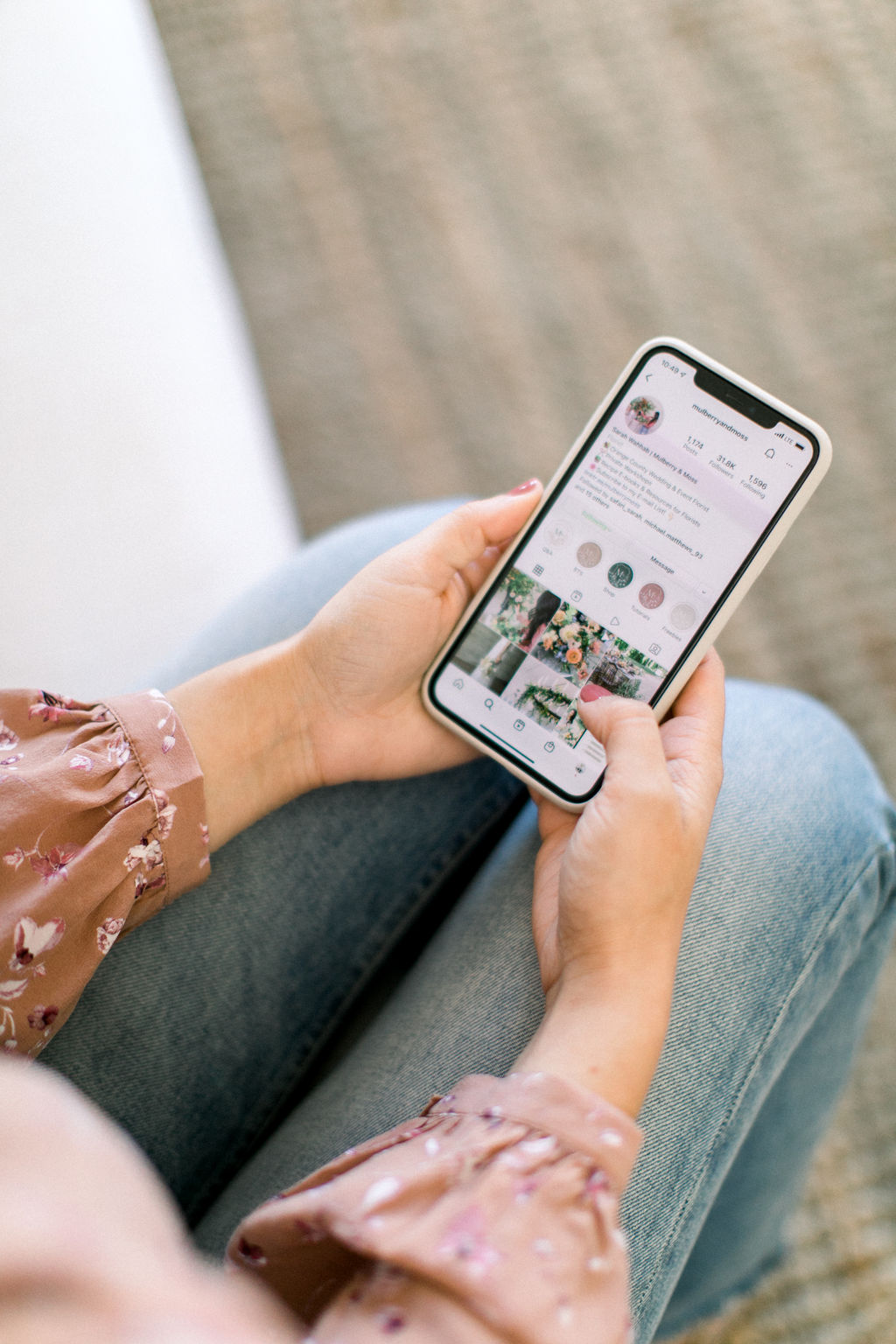You know that voice in the back of your head when you go to try something new that says you’re not qualified enough or talented enough or educated enough to do the thing you want to do… and makes you want to just stop all together? That, my friend, is a little enemy called imposter syndrome and today I want to talk about this. I’m going to share with you how I’ve dealt with imposter syndrome in my business and what I’ve learned from walking into fear.
Let me start off by saying that if you think that you’re the only person who deals with this, you are definitely not alone. The truth is I am pretty sure that every entrepreneur deals with this at many points in their life, in fact, when I look back on all the times I wanted to start something new in my own business, I don’t think there was ever a time that I was qualified enough or educated enough. But guess what! I did it anyway. I leaned into my insecurities and made a decision not to care. I thought, “this is something I want, I know that I can become great at it, and I am going to give it a try no matter what others might think or feel about it.”
Obviously this determination doesn’t come easy and there were definitely battles that happened within myself every time I ever approached a new challenge and felt unqualified. But once I made the decision to step into fear a few times over, I came out the other side realizing that there really was no good reason to hesitate in the first place. I’ll show you how I got to that place and – who knows? Maybe you will feel that you can take a step forward in your goals feeling a little less afraid yourself or what the outcome might be.
1. Remember Who You are Speaking To
Here’s my first piece of advice when it comes to imposter syndrome. You have to pause and remember who you are speaking to. A lot of times when we struggle with imposter syndrome when it comes to fear of judgment, we are thinking about our peers. Our peers are the ones who might roll an eye when we’re over here teaching about simple foundational steps and they’re over there like, “thanks captain obvious.” Or we’re over here trying to launch a new leg of our business and we’re somehow thinking that our peers are over there hoping that we fall on our face. And they could be. But I’ll tell you who is not thinking that: the ones who are just getting started. The ones who actually have no idea what the heck they’re doing. The ones who have been following your work and feel inspired to take action in their own life and business, and are hungry more steps for how to follow in those same footsteps.
You might be thinking to yourself, “I am not an expert in this area.” Maybe not to some, but think about yourself 5 years ago, or 10 years ago. I’ll go first. If I think about myself 10 years ago, I was youtubing how to make a floral arrangement. Talk about amature status. I’m going to bet that if you’re listening to this, you are not an amateur. And even if you are an amateur at some things, there are other things you’re not an amateur in. I’ve no doubt there are things you’ve dealt with in your experiences and lessons you’ve learned the hard way. There might also be just God-given gifts that you have that are like superpowers. It might be your ability to listen to others, your ability to see things clearly and break down problems in times of stress, or maybe you’re naturally decent at graphic design. Yes there are professional graphic artists out there who won’t need your services, but there are also other people out there who don’t have a creative bone in their body who could probably benefit a lot from what you have to share. The point is you have strengths that others don’t have. Learn into those strengths and find what it is you’re passionate about. Start there. And then remember to separate your peers in your mind from the ones who actually can learn from you. I guarantee you there is someone out there who struggles with something you’re great at. And if you can offer that one person some clarity or help then your efforts will be 100% worth it.
2. The Power of Self-Education
Now, let’s say you’ve decided to start a new business. Maybe its a floral business, or maybe you’ve decided to branch out from your service offering and create an online course or offer a physical product. You have the skill or the talent and you’ve built up the confidence around the content you can offer… but then comes the techy part – the actual setting up or building out that system to deliver the product. This is a whole different ballgame. Sure, you can hire a professional to help in these areas and – depending on how much you’re able to invest in this new venture – you may want to choose to do that. I know that for many of my listeners and myself included we are bootstrapping our businesses and building them from the ground up. So the case may be that you don’t have the money to invest in hiring a professional.
I am very much a DIY kind of person. And when I’ve encountered this problem, the best solution I’ve found is to self educate. This is why YouTube and I have become very close over the years. We are in the digital age and we have the entire universe at our finger tips. I wanted to start a podcast and I figured it out in a day watching a couple videos online. You can start with what you do know and what you are good at, and oftentimes you can easily learn the rest of the skills to fill in the gaps – at least enough to get started.
The first time I was invited to speak at an online floral conference a few years ago, I had never really done anything like that before. I had shared knowledge publicly and done some public speaking and in person workshops, but this online digital conference thing was a whole new learning curve. The host of the conference gave an orientation and sent all these marketing materials and instructions for how to get the most out of the experience. She had said that we could offer freebies or digital swag bag offers in order to grow our e-mail list. The business student in me who has listened to hundreds of marketing and business podcasts knew exactly what she was talking about. I knew that what that meant was that we could use a free download as an opt-in, where the conference attendees would enter their email into a form and then this would trigger an automation to send them their free download. In the social media marketing world they call these “lead magnets.” But the tech behind how to actually put an email funnel together was entirely new to me. So I went online and watched some videos and read some blog posts and figured out how to create a complete opt-in automation. I submitted all of those materials a few days later, and sure enough, when the conference was over I had added 140 new subscribers to my email list, and I had gained a pretty solid new skill of putting together lead magnets.
I didn’t really know what I was doing, but I figured it out and turns out it was effective. And I made a few mistakes… a couple of the emails had broken links and I had to re-send an email or two and say “oops! Let’s try this again!” But I still learned so much from trying and the next time I wanted to create an opt-in funnel, the process was 10x smoother.
When you’re a small business, your best is good enough. You don’t always have the resources to get it done with the snap of a finger so you have to get a little scrappy. But the positive side of having a small business is tou don’t have a billion eyes on you, you’re just serving a small population so I have always felt that this gave me the power to experiment and not be too afraid of messing up. If I do, not that many people are probably going to notice. Now, that doesn’t mean you shouldn’t have high standards for your business, but you can work up to perfect. It’s better to do something imperfectly and get it out there than to not start at all.
My business was built on imperfect actions. Every time I’ve done something new in my business, I’ve put it out there and then a few minutes later thought about ways it could have been better. But it was out there… and guess what. There were a lot of people who thanked me for what I had created for them because it helped them solve a problem. And the next time I created something new, I was able to make it even better because I had the feedback of those who had purchased my thing, and that feedback was an asset that I wouldn’t have had if I hadn’t put out my messy first thing.
Don’t let the fear of imperfection hold you back from doing.
3. Become Your Own Hype Person
The last piece of advice I want to share with you is to be your own hype person. I know this is the hardest thing for most of us. We are our own worst critics. How are we supposed to become our own hype person?
I have one person in my life, my sister in law, who is the most fearless person I know. She is my hype person every step of the way, no matter what it is I’m doing she is always there telling me to go bigger and louder. I am naturally the kind of person who is like, “Here’s this thing I did… I’m just going to leave this here… You don’t have to check it out… but if you do, thats cool I gues…” And she’s over here telling me I need to hold up a big huge sign and be shouting it from the rooftops until everyone knows about it. And I’m like, “yeah but it’s not perfect…” and shes like, “Who cares? If people can’t find you then what’s the point? “
…And she’s right. What is the point?
Did you know that on instagram only 3% of your followers will see your posts? So that means if you have 1000 followers, only 30 of those followers will actually see your post. Not to get off topic, but my point is that if you are not posting about your thing every single day, or at least once a week on repeat, most of the people who are following you are never even going to know that it exists.
So I’ve learned to practice self confidence in my business because if I didn’t have my sister-in-law, I think that I might have never had the confidence to pursue a lot of the things I was afraid of. We all need a hype person and if we don’t have one, sometimes the best solution is to become our own.
A huge part of that is that I try to make it a point to celebrate my wins. No matter how small that win is – whether I completed my biggest wedding yet or whether I made one sale on a product launch – I celebrate that and memorialize it because that means that that win holds meaning. And I will remember the small steps that led me to the big ones. The small steps matter. So treat those small steps as huge victories and this will build your confidence over time.
In Conclusion…
The funny thing about imposter syndrome is that the risks are often made up in our heads and when it comes down to it, we really don’t have that much to lose. Once we realize that the thoughts or opinions of our peers don’t matter. And the things we don’t know how to do can be learned. And the things that don’t end up perfect can make our next effort that much better…. We realize that moving forward should be a no brainer.
I hope today is the day that you take messy action towards your goals…and know that I will be here cheering you on! Have a good day, friend!






add a comment
+ COMMENTS